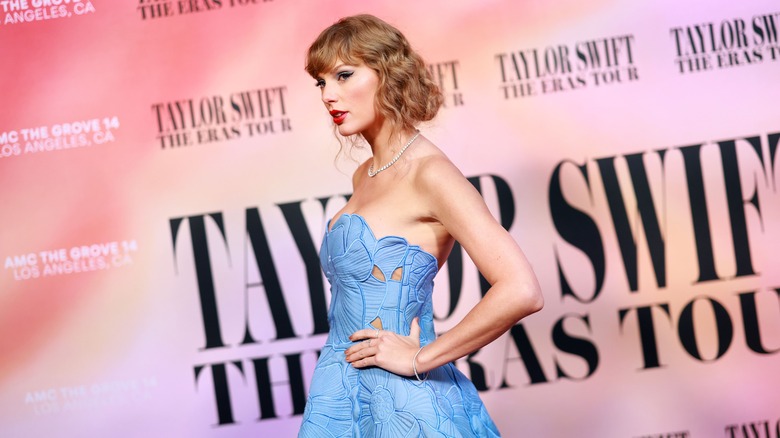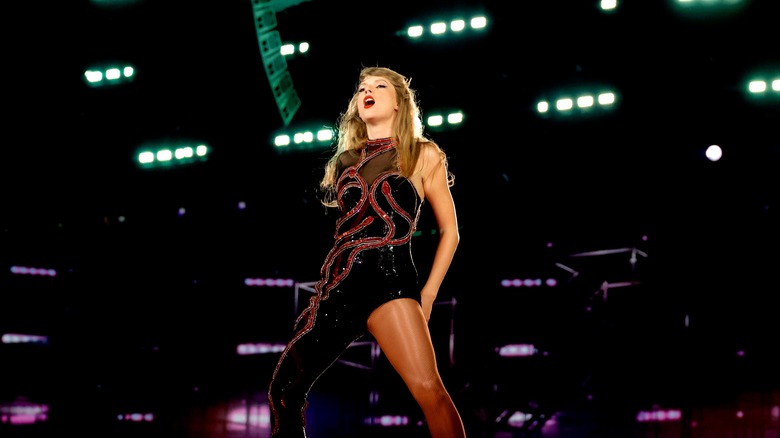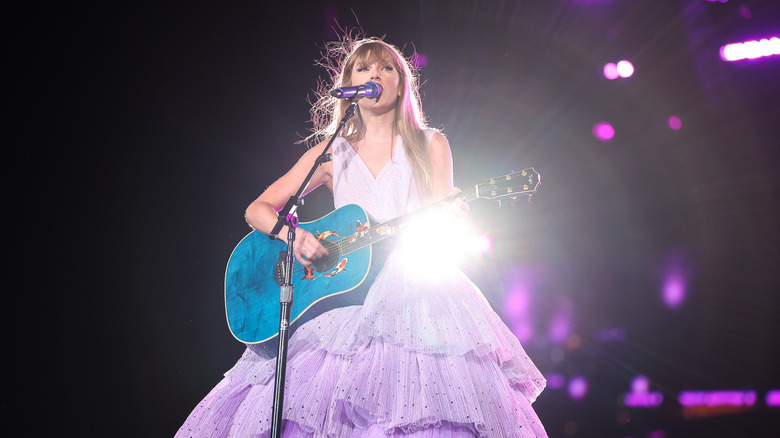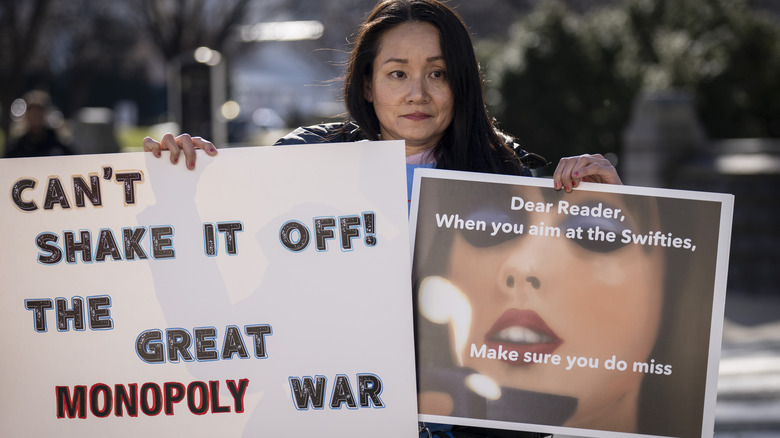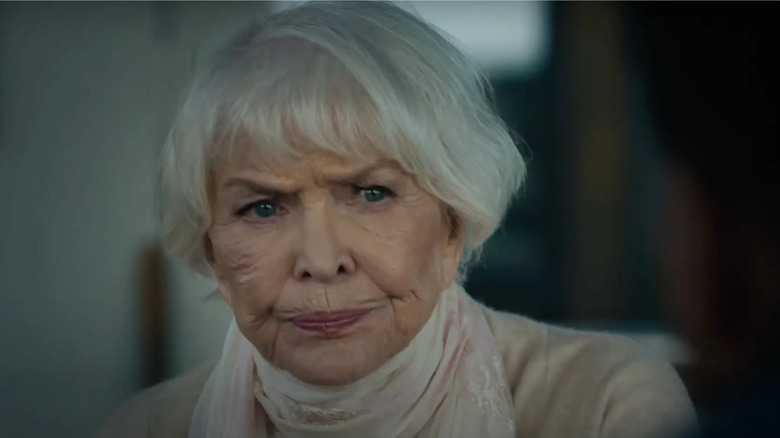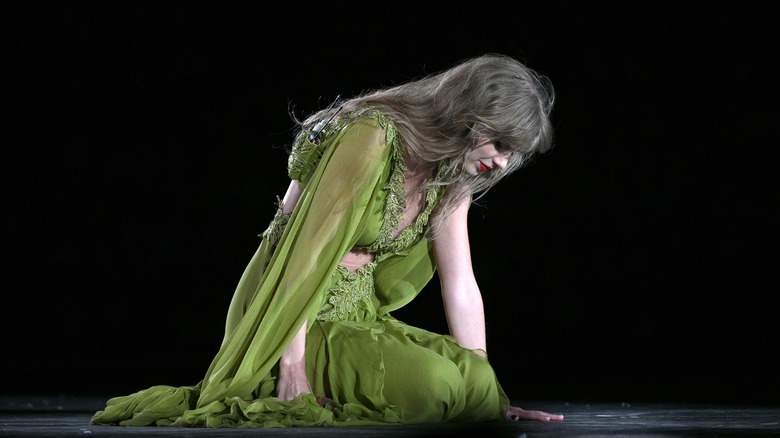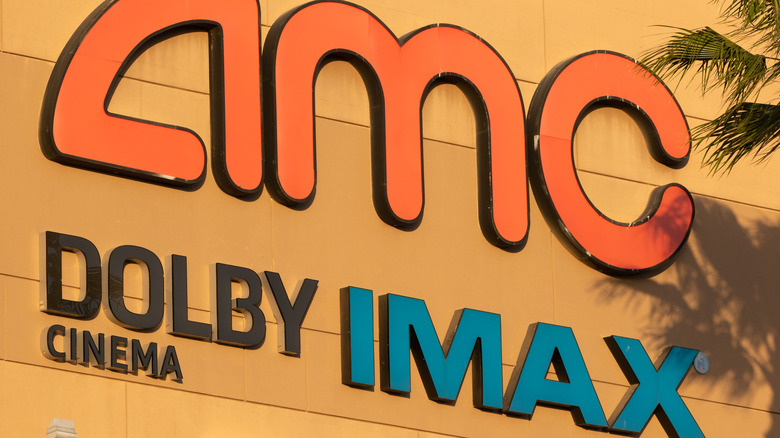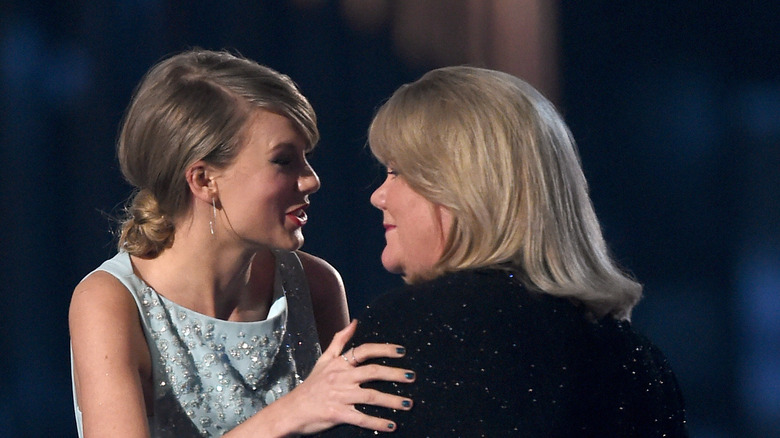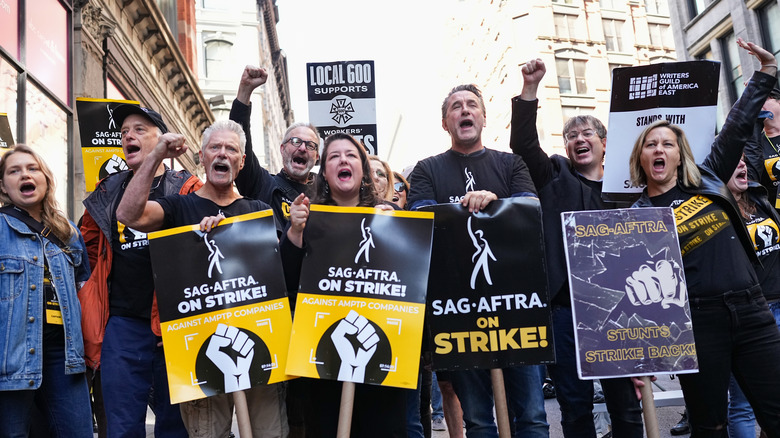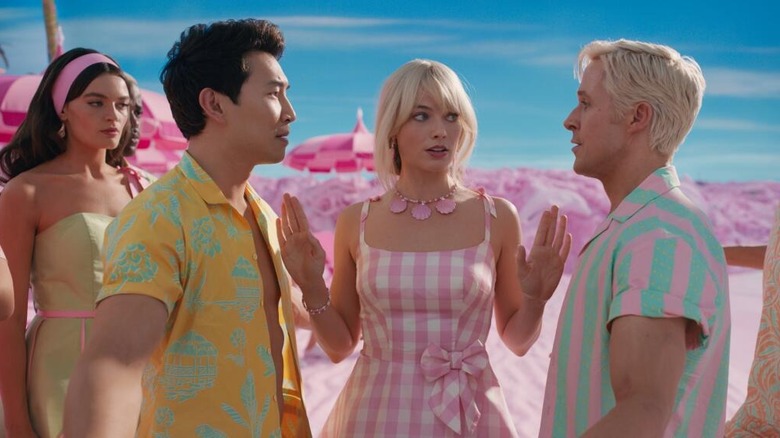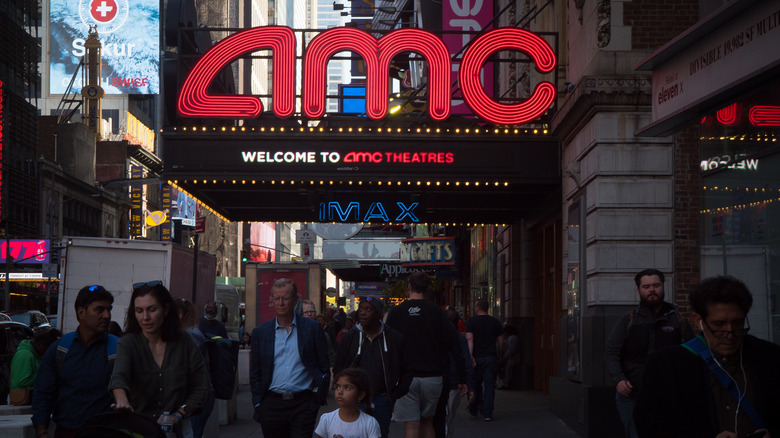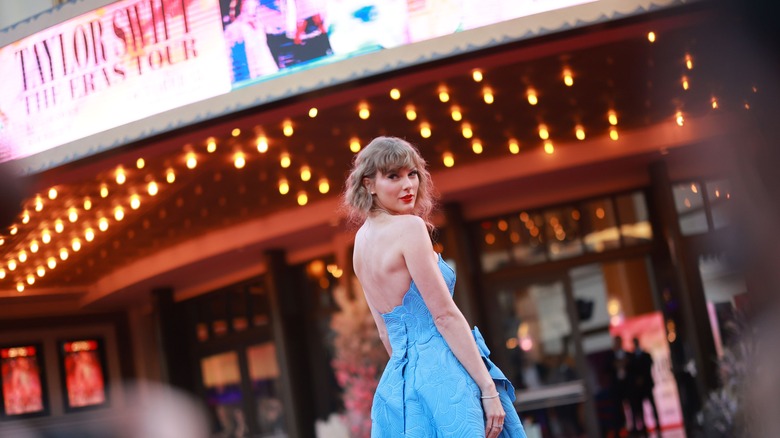Why The Eras Tour Is Blowing Everyone Away At The Box Office
After two weeks at the box office, Taylor Swift's first concert film has outperformed Martin Scorsese's latest $200 million epic "Killers of the Flower Moon" and broken multiple box office records. "Taylor Swift: The Eras Tour" is blowing away its competition and has been doing so for multiple weeks in a row. The movie is Taylor Swift's extension of her record-breaking world tour, word of which has been impossible to escape over the past year. According to CNN, Eras might be the biggest music tour of all time, with Swift climbing the ranks of highest-grossing artists at an unprecedented pace. No matter where you live, it seems to be the case that everyone's got a case of Taylor Swift fever.
Tickets to The Eras Tour were in high demand, which created a large audience willing to pay the price of an IMAX movie ticket to experience the next best thing — "The Eras Tour" concert movie on the biggest screen possible. Naturally, it has become a box-office hit, and for many historical and material reasons, its success is unprecedented. The reasons for this are complex and need a bit of unpacking. So, follow us into the Swifti-verse as we explain why "The Eras Tour" has blown away box office expectations and outperformed one of the best movies of the year.
What did 'The Eras Tour' make at the box office?
"Taylor Swift: The Eras Tour" had a breakout opening. The concert movie made $92 million dollars domestically in its opening weekend. At the time of this writing, the movie's total worldwide box office earning is more than $178 million and may very well have gone up by the time you're reading this.
That is a tremendous amount of money for a documentary, which is the film genre the concert movie ultimately falls into. According to Out Magazine, the film broke AMC's record for first-day pre-sales, grossing $26 million in its first 24 hours of being on sale, outperforming the previous record-breaker, "Spider-Man: No Way Home." Now, since it's been out, it's already become the highest grossing concert movie of all time. The previous king was Justin Bieber, whose "Never Say Never" grossed over $99 million at the global box office. This also makes "The Eras Tour" the first concert movie to make more than $100 million. While that outcome may have been predicted by experts paying attention, we don't think anyone can say if the final total will be twice or three times that figure.
Taylor Swift's popularity is astronomical
Let's start with the obvious stuff.
Taylor Swift is more popular than ever before in her 17-year career. This certainly fueled the sensation that is The Eras Tour, and the fervor for this tour has only made Swift's spotlight shine brighter. Swift has cemented herself as the biggest act in pop music at this point in time.
The tour showed just how large and diverse Taylor Swift's fanbase is to sell as many tickets as it has for the prices they've gone for. Her astronomical rise has been on the minds of many culture writers; The Guardian's Shaad D'Souza credits Swift's current ubiquity partly to the new pop music economy where radio plays matter less than cult-like followings discussing their favorite artist's every move on Reddit and TikTok.
In our opinion, The Eras Tour — both the tour and the concert movie — are only possible because Swift has such an enduring base of fans.
Tickets for The Eras Tour were pricey and hard to come by
This is definitely the biggest factor in the success of "The Eras Tour" film. Leftover demand from the North American leg of the tour is insatiable; Taylor Swift found a way to let even more money pour in while giving fans a second chance to see the show if they couldn't make it IRL. Of course, it took a sizable investment to make the movie — $10 to $20 million according to Puck — but that has more than paid off for Swift now that the film has taken control of the box office.
The tickets for The Eras Tour were so scarce and the resale prices were so high that it nearly broke the Internet. Naturally, this led to media attention, including a Pitchfork investigation into the ills of Ticketmaster and the state of buying tickets for these large-scale events. The end result of this was a group of Swifties taking Ticketmaster to court and filing a lawsuit against the retailer's parent company. The class action lawsuit claimed Ticketmaster had violated antitrust laws.
Why were expectations for the film so low?
Even though this is Taylor Swift at her zenith in terms of fame and mass appeal we're talking about, we have to take into account the history of the genre when talking about expectations. While concert films occasionally turn out to be cinematic masterpieces like "Gimme Shelter" or "Stop Making Sense," these aren't always the biggest money makers in a given year. As established, the highest-grossing concert movie until now was Justin Bieber's "Never Say Never," which didn't crack $100 million. In a film landscape dominated by big studios and streaming platforms, it's been quite a while since a concert movie has felt like an event.
Comparing this to the year's biggest movies — for instance, "Barbie" made almost $1.5 billion — Swift's box office takeaway might not seem like much. It's worth noting, though, that the budget for a concert documentary is often 10 times lower than that of a Hollywood production. That exact proportion is the difference between the $20 million budget of "The Eras Tour" and the $200 million budget for "Killers of the Flower Moon."
The movie didn't have any opening weekend competition
"Taylor Swift: The Eras Tour" came to theaters on October 13, 2023 — a week with no other major new movies. All the biggest movies at the box office the week "The Eras Tour" came out were released the week before. The movie that wound up being its biggest competition, "The Exorcist: Believer," even got out of the way in anticipation of Swift's dominance. The move was announced in a tweet from Blumhouse founder Jason Blum.
Even though it came out a week before Swift's film, "The Exorcist: Believer" bombed anyway, making $11 million during the opening weekend of "The Eras Tour." Word of mouth on that specific sequel was pretty sour, but even with a better critical response, an R-rated horror movie was never going to compete with the marketing force that is Taylor Swift.
Outselling "Killers of the Flower Moon" in the concert film's second week in theaters is a much more impressive feat. Yes, "Killers" is a three-and-a-half-hour R-rated drama, but it's from "Goodfellas" and "The Departed" director Martin Scorsese and features the considerable star power of Leonardo DiCaprio and Robert De Niro. Yet, despite the mostly glowing reviews, "Killers of the Flower Moon" could not compete with "The Eras Tour."
Parents could bring kids
In a normal world, tickets to The Eras Tour would have been affordable for every family to bring their kids if they wanted to. Still, even if you could afford tickets, other factors got in the way: It's harder to travel with children, and kids have a harder time staying up late for a long concert. Eras Tour setlists were routinely over three hours long. But if your kid falls asleep in the middle of a three-hour movie, well, it's not as big of a deal. Plus, it's a lot easier to get everyone together and file out of a movie theater than it is a sold-out stadium. In the time it would take you to get to the concert stadium parking lot, you can make the drive home from the movie theater.
Young people are a large part of Taylor Swift's demographic and the fans who were too young to go to the show can see the movie with their parents. Immediately, that makes for a bunch of tickets sold, as evidenced by the pre-sale numbers that "The Eras Tour" movie put up. Smashing that pre-sale record was the sign of things to come for this epically successful concert movie.
The film has major IMAX appeal
As far as cases for seeing specific 2023 films in IMAX go, there's a strong argument for the IMAX potential of "Taylor Swift: The Eras Tour." The appeal is obvious. You are already going to the movie not for a narrative, but for the immersive experience you can only get from being in a movie theater. IMAX's strengths enhance the audiovisual experience of movies with an emphasis on spectacle. "The Eras Tour" is all spectacle and a natural fit for the format.
On opening weekend, the film was shown on 625 IMAX screens in 45 markets around the world and IMAX sales accounted for a double-digit percentage of the $100 million opening weekend pre-sales. That is a pretty massive percentage for a format most movies don't even get released in.
More screens means more IMAX tickets sold, and it's a pretty common practice for AMC Theaters to charge more for IMAX tickets. The extra bump theaters get from the added cost of that IMAX up-charge is worth factoring into box office success of "The Eras Tour."
Swift's family produced the film and partnered with AMC theaters to distribute
One of the reasons "The Eras Tour" film got made was that Taylor Swift took it on as a personal project. The ostensible star of the movie also produced it. According to Puck, Swift and her family put up the $10 to $20 million that it cost to fund the project. It's not a surprise that they would be able to make this happen, given how much money they have made on The Eras Tour alone.
According to Fortune, the tour is set to be the first to ever shatter $1 billion made in ticket sales — that's not even including the $75 hoodies and $45 t-shirts. The self-production and funding of the movie was a major flex on the part of the Swifts. When you're the biggest pop star in the world it turns out you don't need something as silly as a movie studio to make your concert movie happen.
Bypassing studios allowed her to cash in on the hype
Working with AMC directly wasn't a move made entirely to prevent sharing profits, as one might suspect. Going outside Hollywood allowed Swift to cash in and get the film produced quickly. This is how, according to Fortune, Swift made her movie despite the ongoing SAG-AFTRA strike. Swift reportedly received SAG's permission to make the documentary as long as it adhered to the union's interim agreement. This is not entirely unprecedented, as the union struck a similar deal with A24.
While she certainly doesn't need the popularity boost, the film is certainly going to motivate even more ticket sales for the tour, which continues internationally through November 2024. If the movie didn't come out for another year, it might not have hit quite as hard. The pop star's success is an indicator that movie theaters don't need big studios to see box office returns.
Due to both the SAG-AFTRA and WGA strikes, this fall became an unconventional and unpredictable season at the box office. Studios have pushed back major scheduled releases like "Dune: Part Two" to 2024. Even after the writers' strike ended, releases still got pushed out of their original windows. This gave Swift the opportunity to swoop in and make "The Eras Tour" the biggest movie of October. By not working within a stalled Hollywood system, Swift could release the movie in a timely manner while Eras Tour hype was still strong.
How does 'The Eras Tour' compare to the box office hits of the summer?
When it comes to the current competition, we've established that "The Eras Tour" is blowing everyone out of the water. Let's put that success in comparison to some of the biggest movies of the year, starting with the tremendous summer.
"Barbie" is the biggest hit of the year, grossing over $1.4 billion at the worldwide box office. Its competitor-slash-companion "Oppenheimer" fell just shy of $1 billion. "The Eras Tour" was never going to hit the heights of these giants, nor that of "The Super Mario Bros. Movie," which grossed a mighty $1.36 billion. If we look closer to where "The Eras Tour" lands on the list, it seems sure to slip into the top 20 for the year. At $178 million in the first two weeks of release, "Eras" is looking to overtake "Teenage Mutant Ninja Turtles: Mutant Mayhem," "The Equalizer 3," and "Insidious: The Red Door" with another weekend of strong sales.
It's worth restating, though, that the budget for all of the year's top-grossing films crossed the $100 million mark and Swift's film was apparently made for somewhere around $20 million.
AMC was incentivized to promote the movie
The way the deal between the Taylor Swift and AMC Theaters shook out is another potential reason for its runaway success. AMC agreed to a contract with Swift that earned her 57% of the earnings on the film and leaving AMC the rest. According to Variety, this is a smaller cut than many major studios take — Marvel is cited as an example of a studio that receives closer to 65% of the box office profits. Getting an advantageous deal could be quite a boon for AMC as it turns out the company has a hit on its hands.
According to MarketWatch, shares of AMC have fallen 73.3% in 2023, although the comparatively successful summer haul of "Barbie" and "Oppenheimer" created some cause for optimism. Taylor Swift's concert movie lighting up the box office may just continue the upward trend for the movie theater company.
What does the success of 'The Eras Tour' mean for the box office going forward?
There are a couple key things to glean from the box office success of Taylor Swift's "The Eras Tour." For starters, Swift's partnership with AMC sets a precedent for concert films going forward — one that has already been followed up by the other biggest female pop act in the world. Beyonce's upcoming ambitious concert film "Renaissance" is going to be distributed through AMC Theaters in a similar fashion. According to Variety, Beyonce negotiated directly with AMC for the release of the filmed version of her Renaissance World Tour.
This doesn't just feel like the way of the future for concert movies — a genre that has been increasingly relegated to streaming platforms as the years go on. In the wake of labor tumult in the land of Hollywood, AMC is opening the possibility of working directly with filmmakers and creatives without the need for a studio to act as a distributor.
